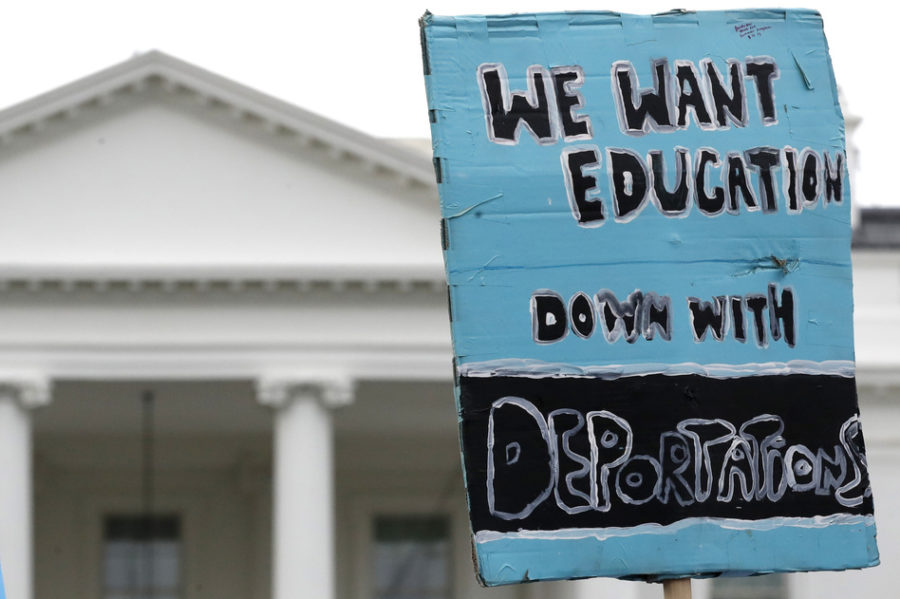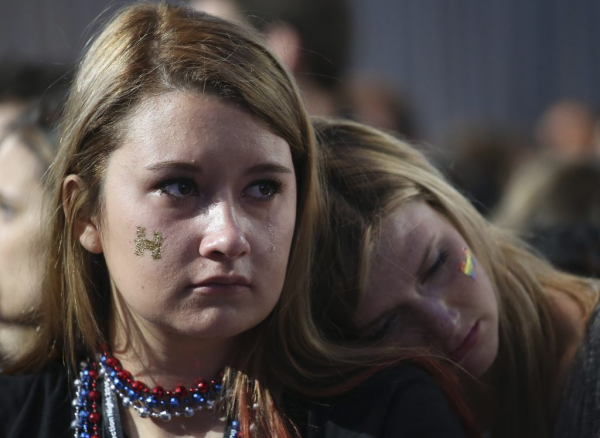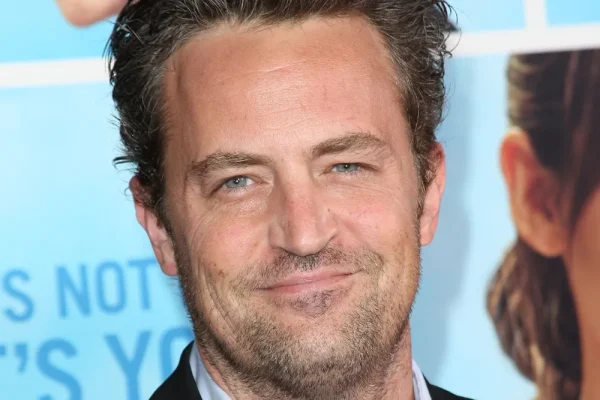The revocation of DACA poses a threat to the lives of undocumented youth
A sign is held up by the White House in support of the DREAMers and the Deferred Action for Childhood Arrivals (DACA) program, on Sept. 5, when Attorney General Jeff Sessions announced the Trump administration will “wind down” DACA. (WBUR News)
Dan Lee is in the Deferred Action for Childhood Arrivals (DACA) program. Apart from having close relatives and confidants, the secret of being in the country illegally has weighed on Lee ever since he learned that he didn’t have the proper paperwork in high school while applying for a job.
In an interview with NPR’s Michel Martin, Lee remembers being 15 years old and thinking, “What is the point of me doing anything if I’m not going to able to have a career or be able to, I guess, be ‘normal’?”
Lee’s parents brought him to the United States from South Korea in the hopes of giving him an American education. From what he can gather from his parents, they tried to pursue citizenship but ended up falling victim to an immigration scam.
“My parents, they were scammed by a supposed immigration attorney and they didn’t speak English. They didn’t know how the American system worked. They didn’t know the laws here and they just assumed, “Oh, if we hire an attorney, everything will work out.” Turns out it didn’t.
Because of DACA, Lee was able to get the documents needed to get a job and apply for school. Today, he’s a fourth-year political science student at American University in Washington D.C.
With the news about Trump phasing out DACA, Lee felt compelled to speak out about his experiences.
“It’s like when you’re on a chair and you lean a little too back and you’re just about to fall, right? And it’s like feeling that perpetual falling feeling. I just want to be able to know if I’m going to be able to keep what I built here. I want to be able to one day own a house, have a family, have a job and watch football on Sundays peacefully,” Lee states.
“There are 800,000 people just like me,” Lee says. “People who have full-time jobs, attending school. They are the types of immigrants you want in your country.”
DACA was created through an executive order by former President, Barack Obama, in 2012. The order allowed certain people who came to the U.S. illegally as minors to be protected from immediate deportation.
Recipients like Dan Lee, called “Dreamers,” were able to request “consideration of deferred action” for a period of two years, which is subject to renewal.
Individuals were able to request DACA status if they were under the age of 31 on June 15, 2012, arrived in the U.S. before turning 16, and continuously lived in the country since June 15, 2007.
It’s down to the wire for President Trump and lawmakers to come up with a plan for the hundreds of thousands of young, undocumented immigrants living in the U.S.
Trump’s administration has officially announced to phase out DACA, affecting all those children who came to the U.S illegally.
A plan for these young people was not included in the recent spending bill to keep the federal government open, despite a standoff that resulted in a three-day government shutdown. However, Republican legislators promised to address the issue of immigration reform soon.
Nearly 800,000 undocumented youth are apart of the program. Thousands of people could lose their jobs if the permanent revocation of DACA actually happens, according to a study by the left-leaning think tank, the Center for American Progress.
The DACA program helped a lot of immigrants, for example, Dan Lee. He became a fourth-year political science student at American University in Washington D.C. The program intends to help non-criminal immigrants and Lee believes it should continue because, “these are the immigrants you want in your country.”

I am in 12th grade. I would like to be a physical therapist. I took journalism because I love writing and I want to develop my English skills. English...








